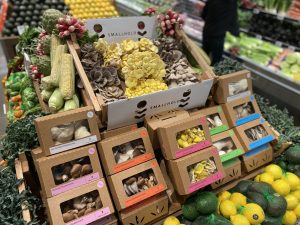Smallhold Opens First LA County Indoor Mushroom Farm
In May, Smallhold will begin delivering locally grown, USDA Certified Organic specialty mushroom varieties s to Southern California from its 34,000 square foot facility in Los Angeles County. This West Coast expansion, alongside existing farms in Brooklyn and Austin, furthers the 5-year-old company’s mission to build a hyper-local solution to a broken global food supply chain.
 Smallhold is launching in more than 90 stores, including Whole Foods, Erewhon and Lassen’s. Southern California customers will also be able to order Smallhold mushrooms online via ecommerce players Good Eggs, Imperfect Foods and others. Acclaimed restaurant Kismet, known for celebrating fresh and vegetable-based Mediterranean-inspired dishes, is officially Smallhold’s first culinary partner in Los Angeles.
Smallhold is launching in more than 90 stores, including Whole Foods, Erewhon and Lassen’s. Southern California customers will also be able to order Smallhold mushrooms online via ecommerce players Good Eggs, Imperfect Foods and others. Acclaimed restaurant Kismet, known for celebrating fresh and vegetable-based Mediterranean-inspired dishes, is officially Smallhold’s first culinary partner in Los Angeles.
With the opening of this newest farm in Vernon – less than a mile outside of downtown Los Angeles – Smallhold now operates four commercial farms across the United States for a total footprint of more than 75,000 square feet. The goal is to not only to feed more than 2 million people in 2022, but to use mushrooms to change the way people think about their environment, sustainability and biodiversity.
When COVID first took hold of the country in 2020, Smallhold was on the shelf in a single grocery store in Brooklyn, N.Y. Now, Smallhold can be found in approximately 400 retailers and restaurants, including Whole Foods, Safeway-Albertsons, Central Market, and top restaurants including Mena, 232 Bleeker, Hungry House, and Maison Yaki in New York City as well as Uchi, Comedor, and Intero in Austin. This growth has been driven by consumer demand for lower impact, cleaner, better for you produce that will help our society deal with the impacts of traditional agriculture and climate change, the company said.
“This is a huge step for Smallhold, a business we founded five years ago inside a shipping container under the Williamsburg Bridge,” said Andrew Carter, CEO and co-founder. “Having grown up in Los Angeles myself, it’s exciting to bring our mushrooms to my environmentally conscious, culinary-focused hometown.”
Smallhold brings increased choice to consumers by growing harder to find mushroom varieties including organic lion’s mane, blue oyster, yellow oyster, king oyster and more. The average U.S. mushroom case is dominated by button, crimini and portobellos, ignoring an entire kingdom of texture, flavor, and nutrition, the company said.
By building hyper-urban farms in key regions and exclusively using compostable cardboard packaging, Smallhold reduces food miles traveled, improves mushroom quality and extends shelf life – all while drastically reducing carbon footprint, food waste and plastic usage. In comparison, 68 percent of mushrooms consumed in the United States are grown and shipped from Pennsylvania. Almost all Shiitake mushrooms are grown off logs originating outside of the United States, the company said.
“Educating and sparking curiosity about mushrooms is an integral part of our mission,” Carter said. “We want people to ask where their food comes from, think about their diet, and reconnect with the planet. This means installing our Minifarms in unexpected places like The Standard Hotel, or having Smallhold mushrooms on the menu at places like Eleven Madison Park — all while concurrently placing locally grown packaged mushrooms in grocery stores across the nation. We want people to have multiple touchpoints and opportunities to taste delicious, quality mushrooms.”
Smallhold’s indoor farms use proprietary systems to create optimal conditions for organic mushroom growth while ensuring maximum efficiency of water and energy usage. A patented system captures hundreds of thousands of data points per day, giving them the ability to imitate natural environments. This results in higher organic mushroom yields, lower resource use and allows a certified organic, hyperclean, efficient operation. Smallhold mushrooms also grow off byproducts from the lumber industry (mostly sawdust) and then 100% of spent substrate is composted or donated.
Smallhold has composted more than 2 million pounds of spent substrate. The goal is to compost 8 million pounds by the end of the year. Additionally, the Smallhold Community Compost Program provides spent substrate for free to the public through partnerships with community growers, hobby mycologists, compost enterprises, farmers, ranchers and others looking to celebrate fungi and build soil fertility through the power of mycelium.
In Los Angeles, Smallhold is part of a groundbreaking mycoremediation field study testing locally adapted and sustainable solutions for brownfield (AKA contaminated site) cleanup in L.A. County. Led by PhD candidate Danielle Stevenson at the University of California and in partnership with the City of Los Angeles, the study has been using Smallhold’s spent substrate blocks since December 2021, monitoring effects at contaminated sites including a former rail yard, auto shop, metal shop, and others. The results could reclaim contaminated land for future sustainable use and prove to have far reaching ramifications in the field of mycoremediation.
In Los Angeles County, Smallhold continues its practice of hiring locally, always paying above the living wage and partnering with regional non-profits and groups.
For updates on innovations in the specialty foods industry, subscribe to Gourmet News.








